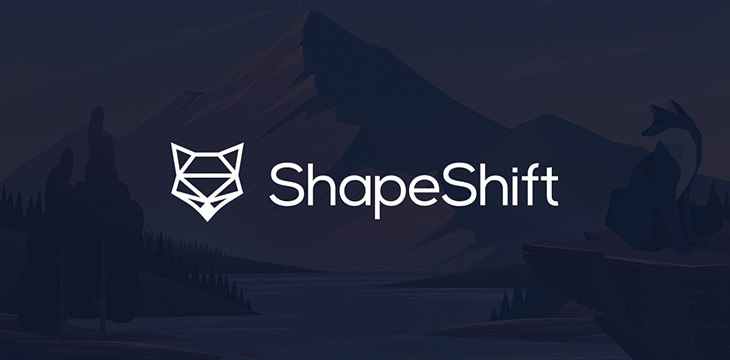|
Getting your Trinity Audio player ready...
|
ShapeShift, the direct-swap digital assest exchange founded by Erik Voorhees in 2015, has delisted a number of “privacy coins” from its platform. According to reports, regulatory risks associated with the use of Monero, DASH and Zcash led to the action.
Many other exchanges, at least those with ties to the U.S., have similarly delisted (or never listed) those assets in recent times, and for the same reason. It’s another sign that reality is finally sinking in to the digital asset community: governments will either find a way to trace previously “anonymous” digital transactions, or find ways to restrict access to them.
Multiple news outlets quoted ShapeShift’s chief legal officer Veronica McGregor as confirming the delistings were due to regulatory concerns.
Remember when anonymity was a key selling point?
When ShapeShift launched in 2015, a large part of its appeal revolved around the fact it would swap digital assets directly to/from users’ wallets. There was no need to create an account or supply any form of identification. As we mentioned the other day, this approach has mellowed out of legal necessity (and reality) over the years. ShapeShift began requiring users to provide KYC details to use the platform in 2018, and has restricted access to users in New York and Washington states rather than comply with their stricter local regulations.
DASH in recent years has sought to play down its status as a “privacy coin,” its leaders even admitting in interviews that the project doesn’t want be labeled as such. These days the community prefers to tout its economic and development model as key drawcards. It’s a big leap from the coin originally named “XCoin” and “Darkcoin”, the primary feature of which was near-anonymous transactions. Reality has set in for DASH and similar projects too over the years and it has distanced itself from its beginnings—though DASH does still offer the “PrivateSend” option which obfuscates transaction details using CoinJoin techniques.
Likewise, Monero and Zcash also launched with “privacy” as their raison d’etre. Indeed, any arguments over which coin is preferable to use are over which one is less traceable.
For a while it was well-known, even to the law-abiding and relative newcomers, that an effective way to break the visible ownership chain of a Bitcoin (or any other open blockchain asset) transaction was to swap it for a privacy coin on a direct-swap exchange like ShapeShift, then swap it back to Bitcoin again. Effectively washed of its history, that Bitcoin amount could be sent to a more compliant exchange for conversion into fiat. It was inevitable that this situation could not continue for long.
These projects now all find themselves in a difficult, yet entirely predictable, situation whereby their most prominent selling points have resulted in their marginalization. Governments and law enforcement agencies simply will not tolerate unregulated, anonymous digital transactions. And no matter how effective the technology, those organizations have many ways to sideline and restrict access to any platform offering them.
While Monero remains the #14 asset by market cap (US$2.12 billion), DASH and Zcash have slipped from the top screen in recent times, and now sit at #32 and #35 respectively.
That’s just reality
Terms like “anonymity” and “censorship resistance” have their appeal on the surface, and everyone wants a degree of privacy. However, given the billions of dollars that circulate in the international criminal economy, it’s foolish to think criminal money wouldn’t immediately rush towards those coins—or that law enforcement wouldn’t notice.
As Bitcoin creator Dr. Craig S. Wright has often said, there’s no way to flaunt regulations and there are many ways governments can put pressure on identifiable, human participants in an ecosystem such as developers, miners with large investments to safeguard, and exchange gateways. He has also explained why society cannot function in an environment where full anonymity exists.
It is for this reason that Bitcoin BSV promotes KYC compliance and the community supports only projects that abide by local and international financial regulations. While Bitcoin addresses remain identifiable mainly by strings of numbers, users must know that determined analysts are always getting better at unmasking their real-life identities. It has always been this way, even on BTC, BCH, LTC, ETH or most others. And blockchain records are public forever.
This is the reality, and though it has taken some longer to accept it than others, it’s not going away. Private but ultimately traceable transactions with global adoption, or anonymity (for now) and obscurity—that’s the choice.
Follow CoinGeek’s Crypto Crime Cartel series, which delves into the stream of groups—from BitMEX to Binance, Bitcoin.com, Blockstream, ShapeShift and Ethereum—who have co-opted the digital asset revolution and turned the industry into a minefield for naïve (and even experienced) players in the market.
Recommended for you
British lawmakers of the parliamentary national security committee have called for a temporary ban on political parties receiving donations in
Circle (NASDAQ: CRCL) soared in 2025 thanks to U.S. ‘regulatory clarity,’ but can this momentum survive a ban on crypto

 02-26-2026
02-26-2026 




